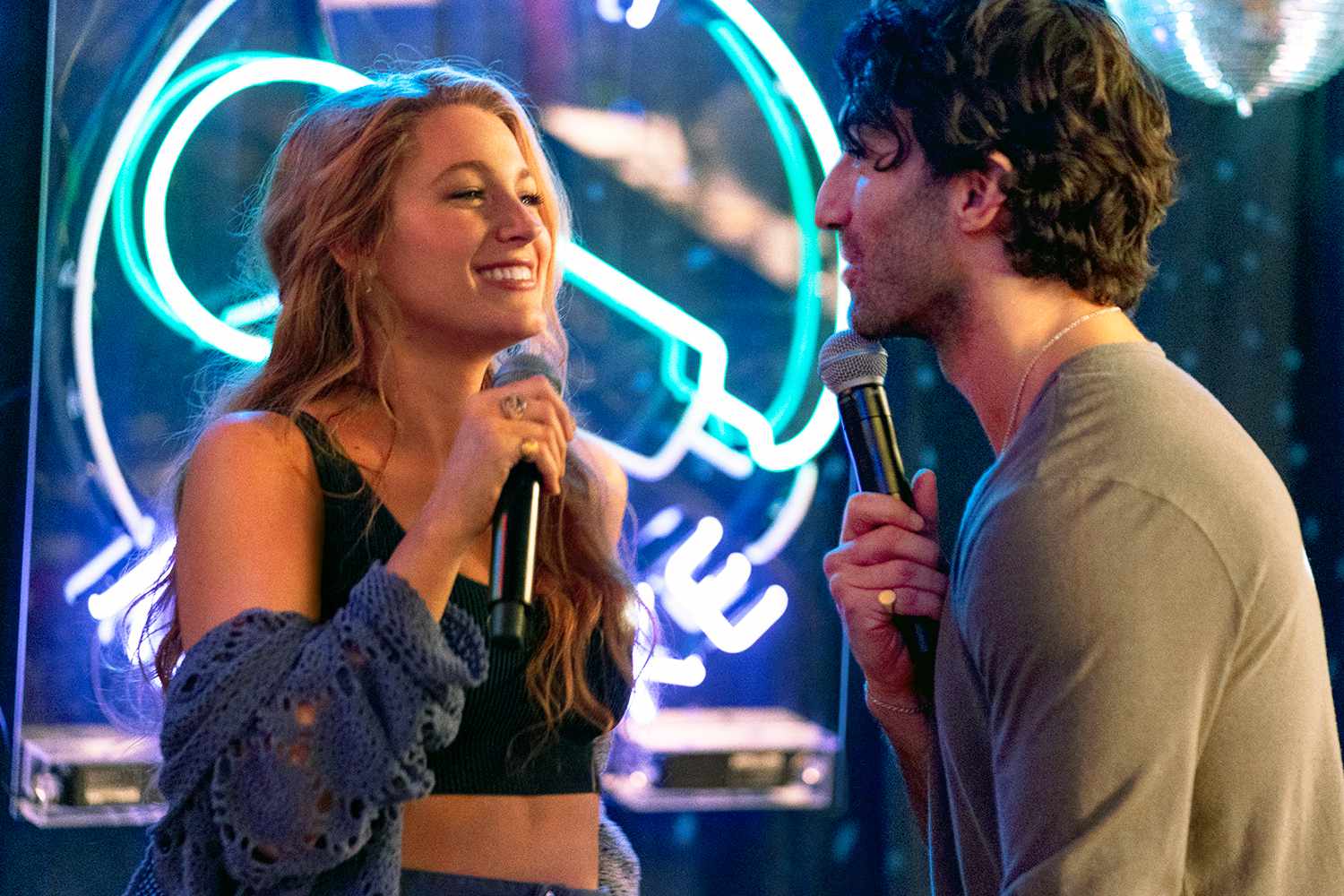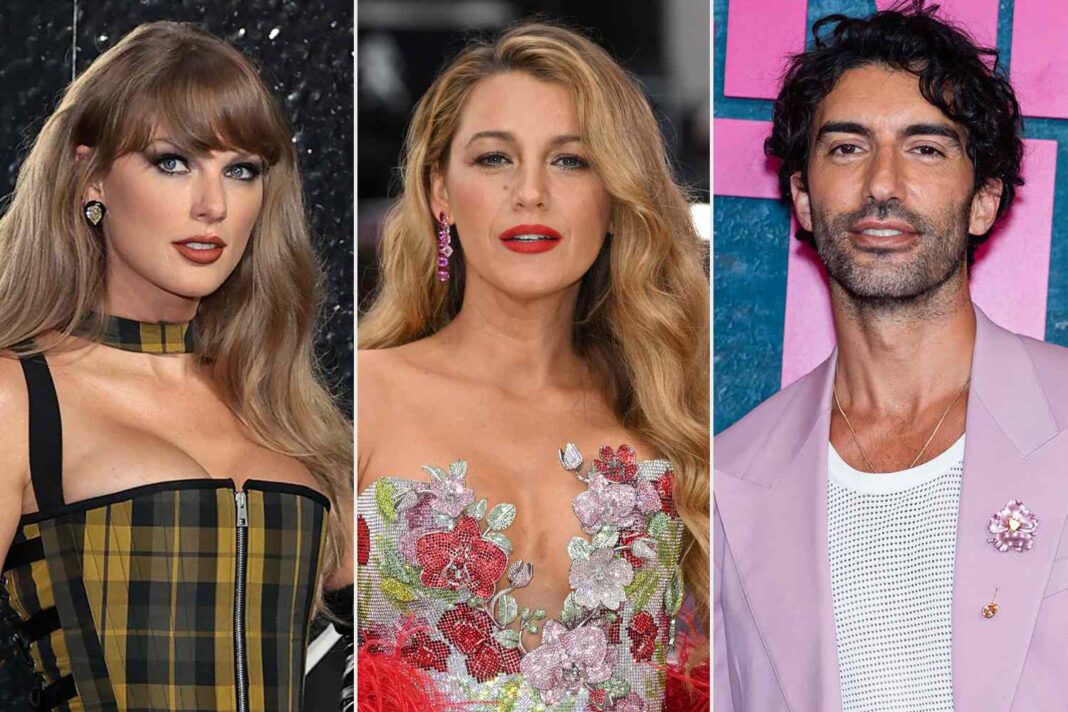Blake Lively’s Hollywood Power Play: A Lawsuit Unfolds In the cutthroat world of Hollywood, where careers are made and broken with every film and every song, a shocking new lawsuit is throwing a spotlight on one of Tinseltown’s most beloved stars. At the center of the controversy is Blake Lively, the stunning actress known for her captivating on-screen presence in films like “Gossip Girl” and “It Ends With Us.” But according to allegations made by Justin Baldoni, Lively’s “Veiled Threat” over using a Taylor Swift song in her movie has now landed them in a heated court battle. As the drama unfolds, fans are left wondering: what really went down behind the scenes, and how far will this lawsuit take its toll on the reputation of one of Hollywood’s most beloved actresses?
Blake Lively Made ‘Veiled Threat’ About Using Taylor Swift Song in It Ends With Us

Justin Baldoni is claiming Blake Lively leveraged her famous friendship with Taylor Swift to hold It Ends With Us “hostage” in a lawsuit filed on Friday, Jan. 31, in which Baldoni alleges that Lively made a veiled threat, implying she might ‘change her mind’ about reaching out to Taylor Swift to secure the use of ‘My Tears Ricochet’ for the trailer if her demands are not met.
According to his version of events, this happened in May 2024 as the actress was allegedly “holding the film hostage in the edit room” and adding “pressure” by “stalling” the marketing plan to get more time to build her version.

Background on the Case
Sony Pictures Entertainment chair-CEO Tony Vinciquerra praised Lively’s “passion and commitment” in August and said, “We love working with Blake, and we want to do 12 more movies with her.” Swift’s song “My Tears Ricochet” was indeed used in the film’s first trailer as well as in a pivotal scene within the movie.
Swift, who has not spoken out about the legal battle, was previously mentioned in Baldoni’s lawsuit, described by his lawyers as Lively’s “megacelebrity friend” who was used to “pressure” Baldoni into accepting Lively’s script rewrites.
Alleged Threat
Justin Baldoni is bringing Taylor Swift back into the narrative amid his legal battle with Blake Lively. In court documents filed on Jan. 31 and published online by Baldoni, the It Ends With Us director accused Lively of leveraging her close friendship with the singer throughout the making of their film—including making a “veiled threat” through a studio executive “implying she might ‘change her mind’ about reaching out to Taylor Swift to secure the use of ‘My Tears Ricochet’ for the trailer if her demands are not met.”
According to Baldoni’s filing, Lively described husband Ryan Reynolds and close pal Swift as her “supportive ‘dragons’,” invoking the Game of Thrones character Khaleesi, who stand up for her and her creative vision, per Baldoni’s lawsuit.

Evidence of the Alleged Threat
Some of Lively’s alleged demands, according to the court filings, included having Baldoni’s “film by” credit removed from posters, as well as Lively getting more time in the editing room with her personal editor to oversee the final cut of the Colleen Hoover adaptation.
“This maneuver felt less like a professional request and more like extortion,” Baldoni’s filing read, “holding the film’s marketing efforts hostage to gain creative control.”
Expert Analysis
Industry experts have weighed in on the situation, with some praising Lively’s efforts to secure the use of “My Tears Ricochet” while others have expressed concerns about the potential impact on the film’s marketing efforts.
Court Preparation
Justin Baldoni is bringing Taylor Swift back into the narrative amid his legal battle with Blake Lively. In court documents filed on Jan. 31 and published online by Baldoni, the It Ends With Us director accused Lively of leveraging her close friendship with the singer throughout the making of their film—including making a “veiled threat” through a studio executive “implying she might ‘change her mind’ about reaching out to Taylor Swift to secure the use of ‘My Tears Ricochet’ for the trailer if her demands are not met.”
According to Baldoni’s filing, Lively described husband Ryan Reynolds and close pal Swift as her “supportive ‘dragons’,” invoking the Game of Thrones character Khaleesi, who stand up for her and her creative vision, per Baldoni’s lawsuit.
Background on the Lawsuit
Blake Lively and Justin Baldoni in “It Ends With Us”. Nicole Rivelli/Sony Pictures Entertainment
The evidence will also show that Sony asked Ms. Lively to oversee Sony’s cut of the film, which they then selected for distribution and was a resounding success.
Her lawyers said in a Jan. 6 statement that her “serious claims” of sexual harassment and retaliation are “backed by concrete facts.”
“This is not a ‘feud’ arising from ‘creative differences’ or a ‘he said/she said’ situation.”
Court Appearance
Lively and Baldoni’s lawyers have their first court appearance on Feb. 3. If the cases progress to a trial, that trial is currently scheduled for March 2026.
Conclusion
As the legal battle between Blake Lively and Justin Baldoni continues to unfold, it remains to be seen how the situation will play out in court. In the meantime, industry experts have weighed in on the situation, with some praising Lively’s efforts to secure the use of “My Tears Ricochet” while others have expressed concerns about the potential impact on the film’s marketing efforts.
Conclusion
In conclusion, the highly publicized lawsuit between Justin Baldoni and Blake Lively has shed light on the intricate world of film production and the power dynamics at play. As per the allegations, Lively made a “veiled threat” to use a Taylor Swift song in the film adaptation of Colleen Hoover’s bestselling novel, It Ends With Us, which Baldoni claims was an attempt to exert control over the project. This development has sparked a heated debate about the role of producers in creative decision-making and the lengths to which they will go to protect their interests.
The significance of this lawsuit extends beyond the realm of Hollywood, as it highlights the broader issues of artistic control, intellectual property, and the exploitation of creative talent. The fact that Lively allegedly resorted to using a Taylor Swift song as leverage raises questions about the value placed on artistry and the willingness of producers to compromise on creative vision. As the film industry continues to evolve, this lawsuit serves as a stark reminder of the need for greater transparency and accountability in the production process.
Looking ahead, this lawsuit may have far-reaching implications for the way producers approach creative collaborations. Will it set a precedent for producers to prioritize artistic integrity over commercial interests? Only time will tell. One thing is certain, however: the outcome of this lawsuit will have a lasting impact on the film industry and the way we think about creative control. As the saying goes, “the show must go on,” but at what cost? The true cost of creative compromise is a price that only the artists themselves can pay, and it’s a cost that we should all be willing to question.
